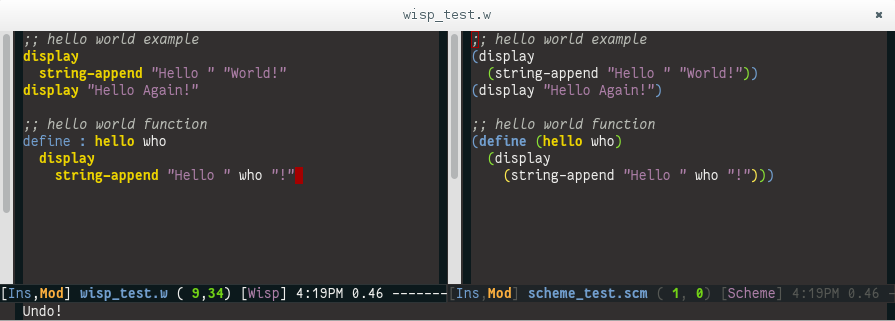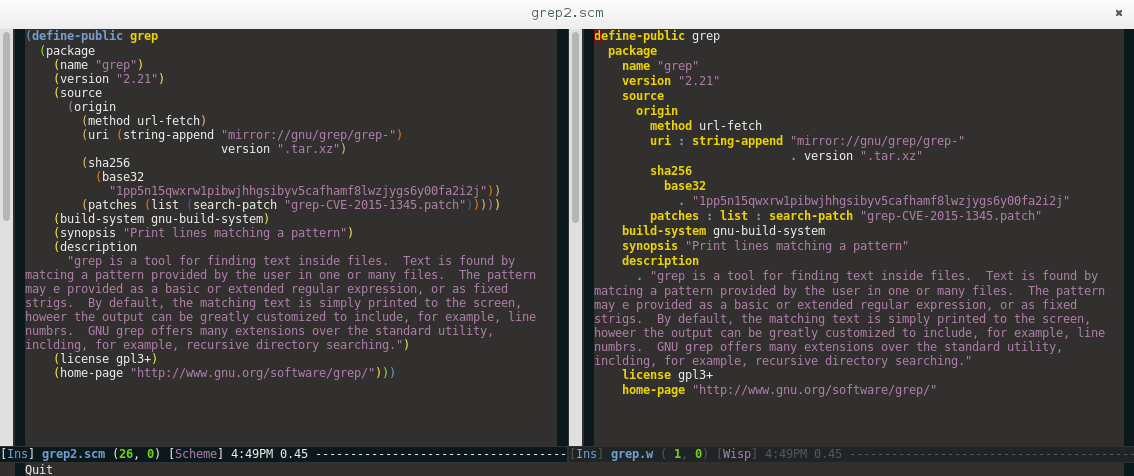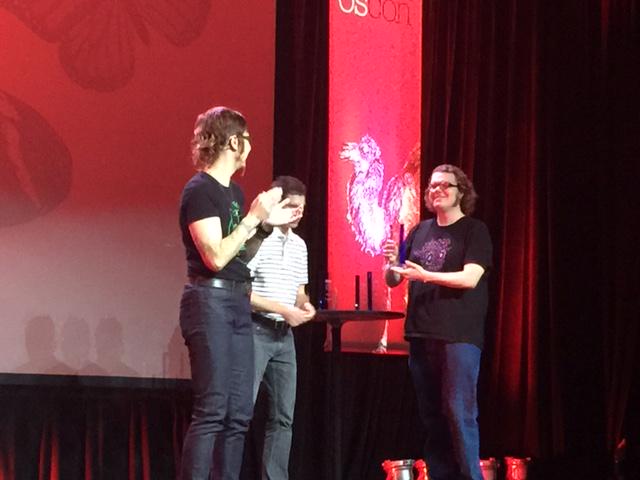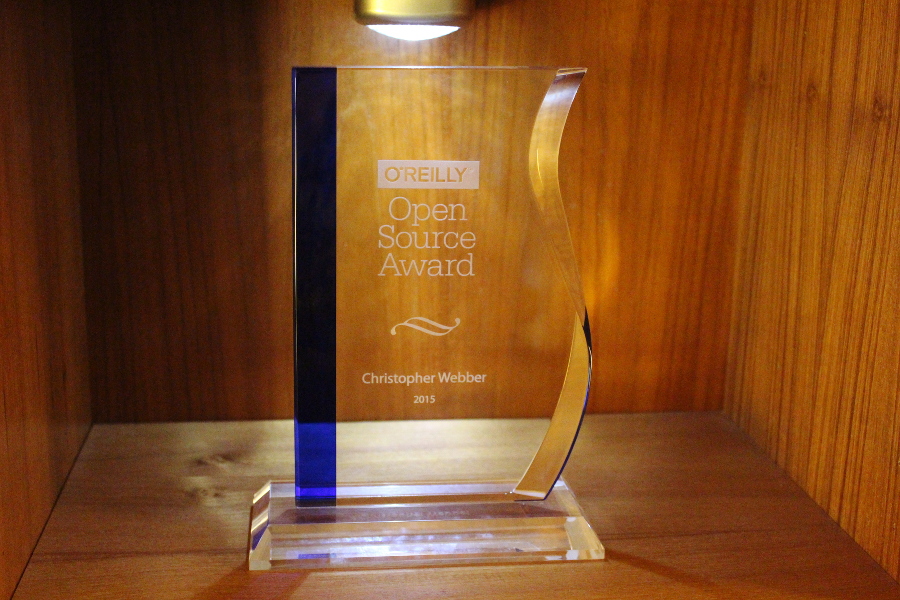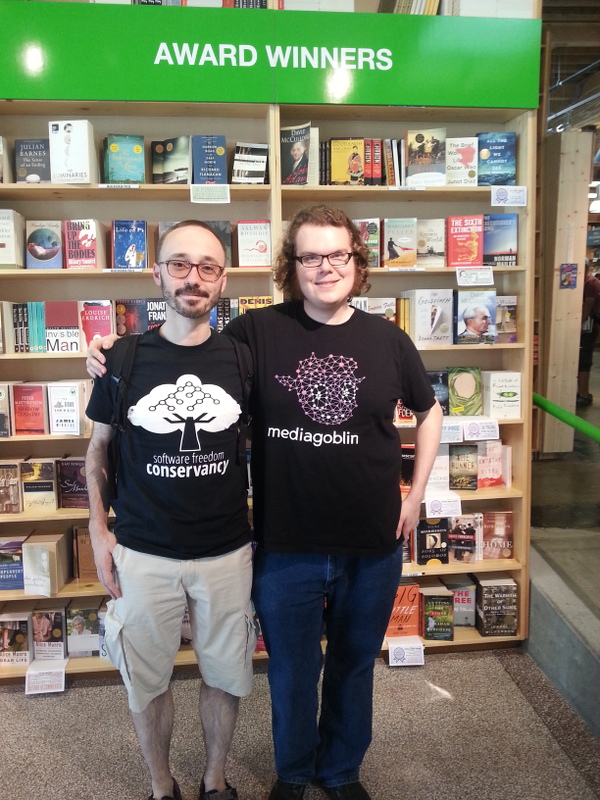The state of packaging of libre web applications is, let's face it, a
sad one. I say this as one of the lead authors of one of such a libre
web application myself. It's just one
component of why deploying libre web applications is also such a sad
state of affairs (hence
userops). It doesn't help
that, for a long time, the status quo in all free software web
applications (and indeed all web applications) was to check javascript
and similar served-to-client web assets straight into your repository.
This is as bad as it sounds, and leads to an even further disconnect
(one of many) between the packages that a truly free distro might
include (and have to manually link in after the fact) and those of your
own package. Your package is likely to become stuck on a totally old
version of things, and that's no good.
So, in an effort to improve things, MediaGoblin and many other projects
have kicked the bad habit of including such assets directly in our
repository. Unfortunately, the route we are taking to do
this in the next release is
to make use of npm and
bower. I really did not want to do this... our docs
already include instructions to use Python's packaging ecosystem and
virtualenv, which is fine for development, but since we don't have
proper system packaging, this means that this is the route users go for
deployment as well. Which I guess would be fine, except that my
experience is that language package managers break all the time, and
when they break, they generally require an expert in that language to
get you out of whatever mess you're in. So we added more language
package management features... not so great. Now users are even more
likely to hit language package management problems, now also ones that
our community are less of experts in helping debug.
But what can we do? I originally thought of home-rolling our own
solution, but as others rightly pointed
out,
this would be inventing our own package manager. So, we're sucking it up
and going the npm/bower route.
But wait! There may be a way out... recently I've been playing with
Guix quite a bit, and I came to
realize that, at least for myself in development, it could be nice to
have all the advantages of transactional rollbacks and etc. There is a
really nice feature in Guix called guix
environment
which is akin to a "universal virtualenv" (also similar to
JHBuild in Gnome land, but not
tied to Gnome specifically)... it can give you an isolated environment
for hacking, except not just restricted to Python or Javascript or Ruby
or C... great! (Nix has something similar called nix-shell.) I know that
I can't expect that Guix is usable for everyone right now, but for many,
maybe this could be a nice replacement for Virtualenv + Bower, something
I wrote to the mailing list
about.
(As an aside, the challenge wasn't the "virtualenv" type side of things
(pulling in all the server-side dependencies)... that's easy. The
challenge is replacing the Bower part: how to link in all the
statically-served assets from the Guix store right into the package?
It's kind of a dynamic linking problem, but for various reasons, linking
things into the package you're working on is not really easy to do in a
functional packaging environment. But thanks to Ludo's
advice
and thanks to
g-expressions,
things are working!)
I'm happy to say that today, thanks to the help from the list, I came up
with such a Virtualenv + Bower replacement prototype using "guix
environment". And of course I wanted to test this on MediaGoblin. So
here I thought, well, how about just for tonight I test on something
simple. How about jQuery? How hard could that be?
I mean, it just compiles down to one file, jquery.js. (Well, two...
there's also jquery.js.min...)
Luckily, Guix has Node, so it has npm. Okay, the docs say to do the
following:
# Enter the jquery directory and run the build script:
cd jquery && npm run build
Okay, it takes a while... but it worked! That seemed surprisingly easy.
Hm, maybe too easy. Remember that I'm building a package for a purely
functional distribution: we can't have any side effects like fetching
packages from the web, every package used has to be an input and also
packaged for Guix. We need dependencies all the way up the tree. So
let's see, are there any dependencies? There seems to be a
[node_modules]{.title-ref} directory... let's check that:
cwebber@earlgrey:~/programs/jquery$ ls node_modules/
commitplease grunt-contrib-uglify grunt-npmcopy npm sinon
grunt grunt-contrib-watch gzip-js promises-aplus-tests sizzle
grunt-cli grunt-git-authors jsdom q testswarm
grunt-compare-size grunt-jscs-checker load-grunt-tasks qunitjs win-spawn
grunt-contrib-jshint grunt-jsonlint native-promise-only requirejs
Yikes. Okay, that's 24 dependencies... that'll be a long night, but we
can do it.
Except, wait... I mean, there's nothing so crazy here as in dependencies
having dependencies, is there? Let's check:
cwebber@earlgrey:~/programs/jquery$ ls node_modules/grunt/node_modules/
async eventemitter2 glob iconv-lite nopt
coffee-script exit grunt-legacy-log js-yaml rimraf
colors findup-sync grunt-legacy-util lodash underscore.string
dateformat getobject hooker minimatch which
Oh hell no. Okay, jeez, just how many of these node_modules directories
are there? Luckily, it's not so hard to check (apologies for the hacky
bash pipes which are to follow):
cwebber@earlgrey:~/programs/jquery$ find node_modules -name "node_modules" | wc -l
158
Okay, yikes. There are 158 dependency directories that were pulled
down recursively. Wha?? To look at the list is to look at
madness. Okay, how many unique packages are in
there? Let's see:
cwebber@earlgrey:~/programs/jquery$ find node_modules -name "node_modules" -exec ls -l {} \; | grep -v total | awk '{print $9}' | sort | uniq | wc -l
265
No. Way. 265 unique packages (the list in its full
glory), all to build jquery! But wait... there
were 158 [node_modules]{.title-ref} directories... each one of these
could have its own repeat of say, the
minimatch package. How many
non-unique copies are there? Again, easy to check:
cwebber@earlgrey:~/programs/jquery$ find node_modules -name "node_modules" -exec ls -l {} \; | grep -v total | awk '{print $9}' | wc -l
493
So, there's about double-duplication of all these packages here. Hrm...
(Update: I have been told that there is an npm dedupe feature. I don't
think this reduces the onerousness of packaging outside of npm, but I'm
glad to hear it has this feature!)
Well, there is no way I am compiling jQuery and all its dependencies in
this state any time soon. Which makes me wonder, how does Debian do it?
The answer seems to be, currently just ship a really old
version
from back in the day before npm, when you could just use a simple
Makefile.
Well for that matter then, how does Nix do it? They're also a functional
package management system, and perhaps Guix can take inspiration there
as Guix has in so many other places. Unfortunately, Nix just downloads
the prebuilt binary and installs
that,
which in the world of functional package management is kind of like
saying "fuck it, I'm out."
And let's face it, "fuck it, I'm out" seems to be the mantra of web
application packaging these days. Our deployment and build setups have
gotten so complicated that I doubt anyone really has a decent
understanding of what is going on, really. Who is to blame? Is it
conventional distributions, for being so behind the times and for not
providing nice per-user packaging environments for development? Is it
web developers, for going their own direction, for not learning from the
past, for just checking things in and getting going because the boss is
leaning over your shoulder and oh god virtualenv is breaking again on
the server since we did an upgrade and I just have to make this work
this time? Whose fault is it? Maybe pinning blame is not really the best
anyway, but I feel that these are conversations that we should have been
having, for distributions and web applications to work together, at
least a decade ago. And it's not just Javascript; we're hardly better in
the Python world. But it's no wonder that the most popular direction of
deployment is the equivalent of rolling a whole distro up into a static
binary, and I don't have to tell you what a sad state that
is.
For me, at the moment, I'd like to be more conscious of what it takes to
build software, not less. Reproducibility is key to long-term software
freedom, else how can we be sure that the software we're running is
really the software we say it is? But given all the above, it's hard to
not have empathy for those who instead decide to toss in that towel and
take a "fuck it, I'm out" approach to deployment.
But I hope we can do better. In the meanwhile, ensuring that users can
actually build and package from top to bottom the software I'm
encouraging them to use is becoming more of a priority for me, not less.
And I guess that may mean, if it isn't really feasible to reproduce your
software, I can't depend on it in my own.
